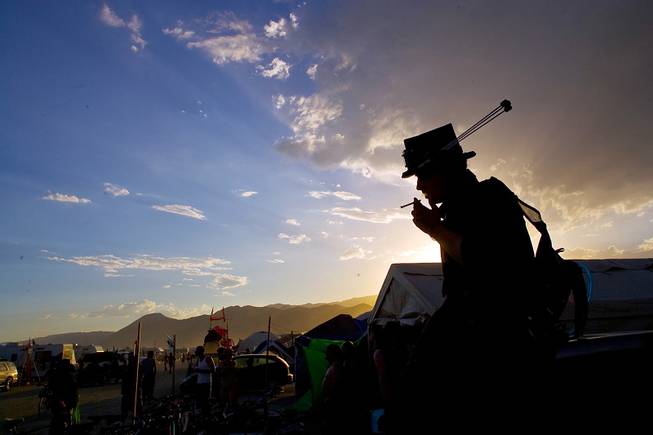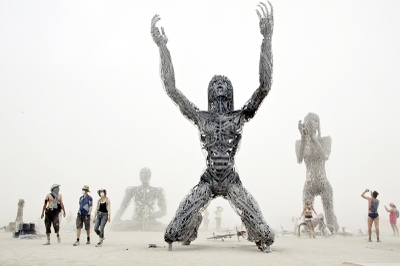
Las Vegas Sun File
A man takes a break from learning how to walk on stilts at Burning Man.
Wednesday, July 27, 2011 | 10:06 a.m.
Burning Man video explainer 2007
This year's festival featured approximately 47,000 people from Las Vegas, the U.S. and the world, who all traveled to an ancient lakebed, known as "the playa" in the Northern Nevada Black Rock desert to build a temporary, all-encompassing community defined more by its spirit, art, and gifting than the normal constraints of daily life.
Electric Playa
There is plenty of partying during the daytime hours of the six-day radical self-expressive event known as Burning Man — held annually in Nevada's Black Rock Desert. But the pulse picks up even more when the sun goes down on the barren playa, as nearly 50,000 burners really start to play.
Sun coverage
When Burning Man organizers abruptly closed ticket sales this week, they created an instant black market for tickets to the counterculture celebration that draws 50,000 people to the Black Rock Desert north of Reno each Labor Day weekend.
Some prices last week shot as high as $25,000 for a single ticket with a face value of $360.
But don’t expect the state to get a cut of the ticket revenue — even from legitimate ticket sales.
Because it’s considered an art festival, the week-long participatory event that culminates in the conflagration of a towering wooden structure in the shape of a man, isn’t subject to the state’s live entertainment tax.
It’s not the only massive Nevada festival that doesn’t have to fork over live entertainment dollars to the state.
The Electric Daisy Carnival that drew, by some estimates, 230,000 people to listen to three days of dance music didn’t have to pay it either.
Why? The performances were held in outdoor venues.
“We looked into it before the event was held,” said Chris Nielsen, interim director of the Nevada Taxation Department. “There is a specific exemption for concerts held outdoors.”
Since it was created in 2003, the live entertainment tax — 10 percent for smaller venues and 5 percent for larger ones — has been the subject of wrangling.
Does it, for instance, apply to the wandering violinist who serenades you while you dine at a fancy restaurant? After much debate the answer was ultimately no.
Does it apply to baseball tickets? Again, no.
What about NASCAR? Nope, another special exemption.
But the exemptions are letting significant revenue slip the state’s grasp at a time when it’s hurting for money.
If the 5 percent tax was assessed on the estimated 50,000 tickets sold for Burning Man, it would have generated nearly $1 million. This was the first year Burning Man tickets “sold out.” Organizers had to stop sales to stay under the 50,000-person limit imposed by the Bureau of Land Management.
The Electric Daisy Carnival had a two-tiered ticket price. But on the low end of the estimate, a 5 percent tax assessed on 230,000 of the cheapest tickets would have generated $1.15 million for the state.
Neither event asked for the exemption. The art festival designation was fought for by the Reno Artown event. And the outdoor concerts exemption was in place long before Electric Daisy even considered moving to Las Vegas.
But some lawmakers are saying those exemptions should be revisited.
“Sometimes they are proper at the time, but we don’t leave room to at least make adjustments for new events coming in,” said Assemblywoman Marilyn Kirkpatrick, D-North Las Vegas, chairwoman of the Assembly Taxation Committee. “I mean, who would have ever thought we’d have a rave that was that huge? I don’t think something like that was even taken into consideration.”
No one disputes that the massive events generate significant economic impact outside of the live entertainment tax. Electric Daisy Carnival patrons packed hotel rooms and crowded downtown Las Vegas.
Burning Man organizers estimate they spend $5 million a year in Nevada, planning and producing the event. Burning Man participants spend heavily on supplies, car rentals and rooms, generating an estimated $15 million for the Northern Nevada economy.
“Burning Man has a huge economic impact footprint in this town,” said Assemblyman David Bobzien, D-Reno.
He said the Legislature should look at the big picture instead of nit-picking the many exemptions.
“We really need to stay focused on the broader based tax reform,” he said.


Join the Discussion:
Check this out for a full explanation of our conversion to the LiveFyre commenting system and instructions on how to sign up for an account.
Full comments policy